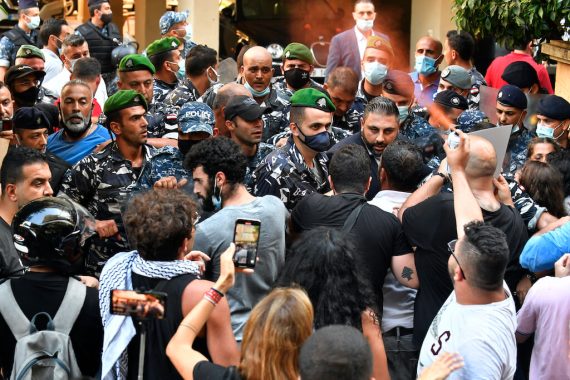There are many reasons why nations go to war and even more why they go to civil war. The history of Lebanon in this respect is full of examples why this small Mediterranean nation is always perceived as vulnerable to civil strife.
Lebanon’s current economic and political collapse has unfortunately been a long time coming, as its archaic and medieval political system has struggled for decades to keep itself afloat. Corruption mixed with Iran’s Lebanon proxy Hezbollah have gradually detached Lebanon from the financial safety net which the Gulf Arab states and the international community has always provided.
While many have blamed the failure of the Lebanese political system and the tendency to go to war on sectarianism and international intervention, the crux of the problem lies in Lebanon’s 18 religious sects who have failed to recognize that updating the power-sharing formula, as they did in 1989 with the Taif Agreement, is insufficient if this change is not reflected in the constitution in a manner that provides stability and ultimately paves the way for a sustainable and functional state.
As it seems, there are many indicators which lead one to assume that civil war is at the gates. But, in reality, Lebanon’s current predicament requires more than a civil war to be resolved as many of the elements needed for civil war are non-existent – if not to say meager, at least in the foreseeable future.
As it stands, the only heavily armed and militarized faction in Lebanon is Hezbollah whose involvement and fighting experience in Iran’s regional expansionist project makes it lethal if civil war were to break out in Lebanon. While the rest of Lebanon’s sects and political parties maintain their own version of Praetorian Guards, some of whom were part of the Lebanese Civil War (1975-1990), their small weapons and limited training does not qualify them to a face-off with Hezbollah.
Perhaps more importantly and for the time being, the regional and international appetite for strife is non-existent. The regional tensions between the Arab Gulf states and Iran have shifted the former’s attention to protecting their home front, especially in Yemen and Iraq, two areas which Iran and its proxies have infiltrated and used as bases to attack foreign and Arab interests.
Recommended
Consequently, Lebanon, compared to Iraq and Yemen, is too risky for investing money. This is especially so given that the previous encounters have proven that the anti-Hezbollah faction is equally – if not more – corrupt than their foes, and thus any political investment would equally peter out.
Preparing for war requires political and military mobilization which includes media outlets, training camps, salaries, and funds which Lebanon’s former-warlords-turned-politicians are unwilling to spend and neither are their regional patrons.
Above all, while it might appear from the outside that various political factions are at a disagreement, in reality, there is a symbiotic relationship between the arms of Hezbollah and perhaps the deadliest weapon of all – corruption. Thus, with this quasi power-sharing arrangement, none of the Lebanese factions nor Hezbollah would like to rock the boat, even if this boat is sinking.
In practical terms, recent events which transpired on the ground confirmed that civil war in Lebanon is a zero-sum game as the sectarian composition and division brought about by the 15 years of civil war has virtually created homogenous sectarian units and thus any military action on behalf of Hezbollah at the moment will not yield any clear-cut military victory. Instead, it will further flame sectarian tensions.
Recently, Hezbollah faced off with the Arab (Sunni) tribes of Khalde, south of the capital Beirut, and the Druze inhabitants of the village of Shwaya in the area adjacent to the Lebanese-Palestinian borders, which showed the limits of Hezbollah’s Iranian weapons at least internally.
In Khalde, Hezbollah could not react to the Arab tribes avenging the death of one of their own at the hands of a Hezbollah member just like in Shwaya, where the Druze intercepted a Hezbollah rocket launcher as they refused to turn their homes into potential targets for Israeli retaliation.
Be that as it may, the abovementioned factors, or lack thereof, do not really dismiss the chances of violence breaking out in Lebanon. Any sort of civil strife, though, will not remotely resemble the 15 years of civil war the Lebanese experienced or were told about by their family. The violence which will break out will be guided by fear of famine and the collapse of social order brought about by the total erosion of the Lebanese state.
If the Lebanese do not realize that this illusion of a system they live under needs to change, sooner rather than later, they will be faced with a mutated beast of violence, a beast which their sectarian safety net will not be able to contain, nor external intervention of any kind will be able to suppress.
The specter of civil war(s) is always looming over Lebanon, but, this time around, the international community and the many regional factions are not interested or willing to invest time and money in a country which has proved to be a bigger burden than ever. As Lebanon stands, it is merely an inconvenience and no longer a model of coexistence or diversity as some claim.





